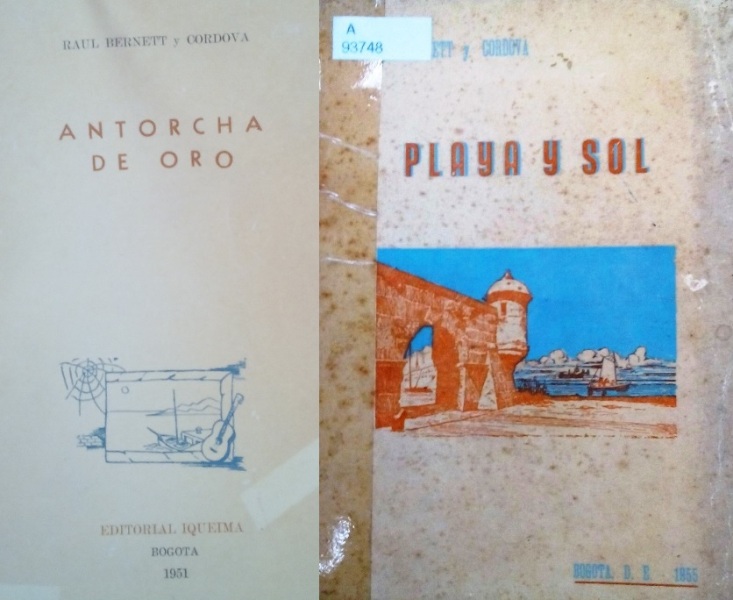
Written by Morima Salome Villalba *
A few days ago in the same place we said that in 1913 Raoul Burnett and Córdova were correspondent in Philadelphia (USA) for the magazine “Actualidades” which was published in Cartagena. Well, today we’re going to extend a performance of this mulatto from Cartagena (read “Charlotte Werther and “The Ladies’ Bouquet”“).

He was born on January 15, 1893. He completed his first studies in the schools of El Socorro and Heredia, then entered the University of Bolivar, today in Cartagena, where, at the age of fifteen, he obtained the title of Doctor of Philosophy and Letters. The following year, he began studying medicine at the same university, and in 1910 his parents sent him to the United States because of his intense love of study and the insistence of his teachers and friends. Two years before this trip, he was the director of “Perfiles”, a literary and variety magazine published in Cartagena.
In North America he first settled in Springfield, Massachusetts, to learn English, where Paul Henry Pitkin (1841-1925) worked as a teacher, and within a few months was translating and pronouncing the language. Good.

From there he went to Philadelphia, Pennsylvania, the oldest university and one of the most important medical centers in the United States, to continue the studies which he had begun at Cartagena. His student life was devoted and he received many privileges as president of the Latin Union (Philadelphia’s Latin American Fraternity); Cosmopolitan club secretary; Fellow of the Steele Medical Society and Basin Surgical Society; Delegate to the University Medical Association and representative of the University of Pennsylvania at a student conference meeting in Northfield, Massachusetts, in 1913.
His craving for knowledge was in such proportion that, during vacations, Burnett devoted himself to visiting some towns in the United States for the purpose of visiting hospitals and acquainting themselves with their clinical developments, being fancied of opening his own practice when he had finished his studies. Through these tours, where he also visited museums, libraries, theaters, and academies, he spoke of great persons with whom he had correspondence, such as Mr. John Barrett, Director General of the Inter-American Union; LS Rwe, President of the American Academy of Political Science and Economics; and Damso Rivas, head of the Nicaraguan delegation to the Third American Congress in Washington, among others.

On June 17, 1914, the University of Pennsylvania awarded him the degree of Doctor of Medicine and Surgery. In order to satisfy his relentless desire to improve his own qualities, he decided to move to the city of Pittsburgh, where for two years he was actively engaged in the hospitals of “Philadelphia General”, “German”, “Phipps Institute of Tuberculosis”, “Children’s and University of Philadelphia”; “Washington Heights” in New York and “Suburban General” in Pittsburgh. Later, he attained the highest qualifications in the State Board Examination or State Examination, which allowed him to practice in the territory of the United States.
Raúl Burnett and Córdova returned to Cartagena in 1916 with all academic distinctions and began his practice in the city with a strong medical reputation that had grown over time. In September of the same year, he traveled again to the United States to marry American Rebekah Naryat Schaefer, in the city of Pittsburgh. Spouses Bernett Schaefer established their residence in Cartagena and opened their own American-style medical office, equipped with an operating room and a chemical laboratory.
He was a professor of the chair of bacteriology at the Faculty of Medicine of the University of Cartagena and a member of the Academy of Medicine and Natural Sciences in the same city. He devoted his time to science as well as to literature, emerging as a writer, poet, and journalist. He published “Playa y sol” (1955) and “Antorcha de oro” (1951), in which he dedicated poems to Rosa Amelia de Delgado, Dmitri Ivanovic and Felipe S. Buzz. Some of his poems are titled “Pedro Vélez Racero”, “Domingo Díaz Granados”, and “Francisco C. Royo”.

Poet Luis Carlos Lopez said of him:
Because it is always in your career
Put all the pain
flower petals
And the spirit of illusion
Burnett, as a physician, found “In the complex labyrinth of science and the harsh scenario of pathological discoveries, the beneficial contrast of color and relationship with poetry, either as a symbolic aesthetic filter valve or as a golden lampAs he himself said:Vibrant and life-giving golden flame“.
* Social Media
.









